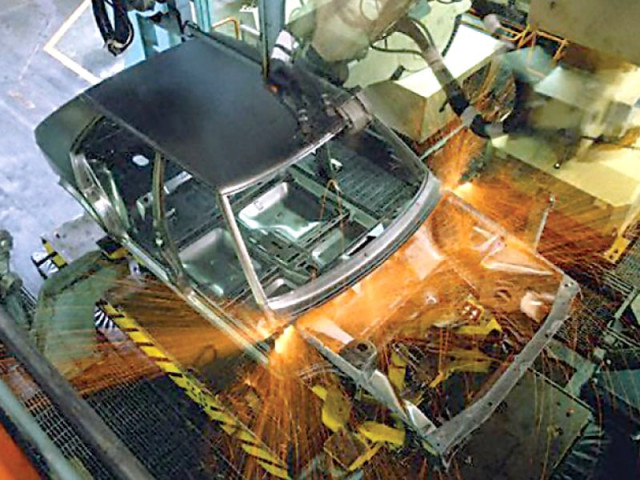Local assemblers stand strong amid SBP, CCP criticism
Deny being extended protection; expect favourable auto policy .

Indus Motor Company had a market share of 33.7% in car sales during the first eight months (July-Feb) of the ongoing fiscal year. PHOTO: FILE
There are always two sides to a story.
While consumers, the country’s central bank and Competition Commission of Pakistan (CCP) continue to lament the state of affairs, the local auto industry stands by its position – that it hardly enjoys protection, is going through tough times due to used car imports and should be backed by the government.
Let’s examine
Among the major industry players, Indus Motor Company had a market share of 33.7% in car sales during the first eight months (July-Feb) of the ongoing fiscal year — its jump was on the back of the new Corolla model launched in 2014. It also posted a net profit of Rs3.1 billion in the first six months (Jul-Dec) of FY15, up by a whopping 132%, compared to the same period of the previous fiscal year.
On the other hand, Honda Atlas Cars reported a net profit of Rs1.58 billion for nine months (April-December 2014), up by 257% compared to Rs441 million in the same period of last year. Pak Suzuki – the country’s largest carmaker – posted a net profit of Rs1.93 billion in calendar year 2014 (CY14), up 4% compared to Rs1.85 billion in CY13.

The numbers suggest that the car industry – mainly covered by the three major players – has done well for itself. It is also reflected in their share prices. Honda Car (symbolised by HCAR on the Karachi Stock Exchange) posted a phenomenal increase in 2014 – from Rs42.12 at the end of closing on January 1, 2014, to Rs198.18 on December 31, 2014. So did Indus Motor – from Rs330 to Rs880.32 on December 31, 2014. Pak Suzuki also posted a return that more than just ‘outperformed’ the benchmark index – from Rs155.47 to Rs371.12.
Given the data, it is hence, safe to assume that investors have placed a lot of confidence in the three companies.
Despite the financial performance, State Bank of Pakistan (SBP) and the anti-trust watchdog were more than just critical in their review of the sector. The CCP, in its report, sought open imports of used cars besides an increase in the age limit – from the current level of three years old to five– aimed at bringing an end to the monopoly of local car assemblers. On the other hand, the SBP endorsed the assessment and advocated the need to reduce protection of the local market and allow the import of new cars.
There is also a common point of view among consumers who feel the rise in prices, lack of quality and restricted choice forces them to import used cars.
The industry responds
Indus Motor Company, however, was clear in its answer.
“It’s unfortunate to see reputable institutions like SBP and CCP issue such reports based on quality of data that is highly subjective,” said a statement by the company in response to a query. “Many companies, as well as the representative associations of automobiles and auto parts manufacturers, have taken time to educate the analysts — especially on the price comparisons drawn between Pakistan and other markets.
“Locally assembled vehicles are competitive with global prices and are, in some instances, actually cheaper in Pakistan than neighbouring countries,” it added.
In its response, Pak Suzuki declared the two reports as being based on “perceptions”.
“The industry has replied to both reports,” stated the country’s largest carmaker that has an annual capacity of 150,000 units – however, it says that it operates only at 50%.
“The facts and figures given in the reports are not correct.”
Expectations from the auto policy
With the auto policy due, the industry expects more than what it has got so far.

“We certainly hope the new auto policy is able to attract credible new manufacturers so that customers enjoy a greater choice of vehicles,” stated Indus Motor. “Equally, the policy must protect the existing original equipment manufacturers and part suppliers who have invested heavily into localisation, creating jobs and enabling transfer of technology.”
It also urged the government to create the required infrastructure for testing facilities, schemes for technology acquisition, human skills development and limit used car imports “that severely damage the growth of the local industry”.
Pak Suzuki, on the other hand, expected a “positive response”. “If a favorable new investment policy for existing manufacturers is provided, then new models with advance technology will come to Pakistan.
“Unfortunately, Pakistan has repeatedly lost opportunities to use the sector as the launching pad for industrialisation. Countries such as Japan, Thailand, China, Indonesia, India have demonstrated the auto sector’s potential to attract investment,” added the company.
REPORTING BY BILAL MEMON
Published in The Express Tribune, March 23rd, 2015.
Like Business on Facebook, follow @TribuneBiz on Twitter to stay informed and join in the conversation.



















COMMENTS
Comments are moderated and generally will be posted if they are on-topic and not abusive.
For more information, please see our Comments FAQ